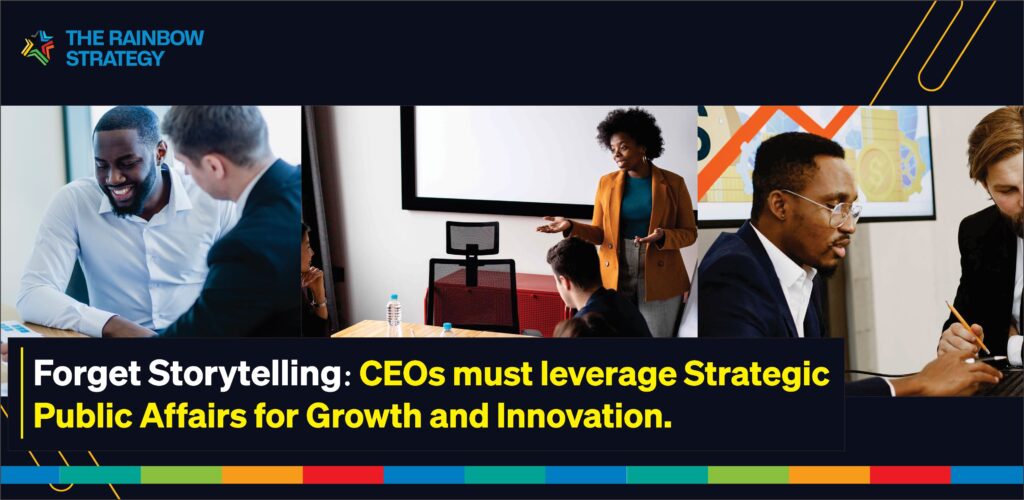Let’s first define Public Affairs.
Strategic public affairs may be described as the proactive management of an organisation’s interactions with key external stakeholders, including government officials, regulators, media, and the public, to influence policy, shape public perception, and enhance the organisation’s reputation and competitive position. It usually involves advocacy, crisis management, stakeholder engagement, and strategic communication to navigate regulatory environments and drive business success.
Our title suggests a shift in focus for CEOs and other business leaders from traditional storytelling to leveraging strategic public affairs. In today’s rapidly evolving business and economic landscape, business leaders must strategically leverage public affairs to navigate complexities, manage risks, and capitalise on opportunities.
Let’s break it down.
- Forget Storytelling: This doesn’t mean abandoning the power of narratives altogether, but rather re-evaluating how they’re utilised in the context of corporate leadership. Traditional storytelling often focuses on brand narratives and emotional connections with customers. However, in today’s complex business landscape, business leaders must go beyond mere storytelling to effectively navigate various challenges and opportunities.
- CEOs must leverage strategic public affairs: This implies that business leaders need to actively engage in managing their organization’s relationships and reputation within the broader public sphere. Strategic public affairs involve understanding and influencing public policy, government relations, stakeholder engagement, and reputation management. It goes beyond just communicating a compelling story to actively shaping the external environment in which the business operates.
- Yet, strategic public affairs combine storytelling, energy, and strategy: This highlights the multifaceted nature of effective public affairs. While storytelling remains important for conveying messages and building connections, it must be complemented by strategic thinking and energetic execution. The energy here implies dynamism and proactiveness in engaging with stakeholders and driving the organisation’s agenda forward.
This emphasises the need for business leaders to adopt a more strategic and proactive approach to managing their organisation’s external relationships and reputation, moving beyond traditional storytelling towards a more comprehensive public affairs strategy. By doing so, they can better navigate the complexities of the modern business environment and drive sustainable growth and success for their companies.
For instance, imagine a CEO, let’s call her Chioma, who is managing a struggling company, Ekwendu Pharma Limited, in a highly regulated industry. Initially, Chioma relied on the traditional approach of storytelling to try and turn the company around. She focused on crafting a compelling brand narrative, hoping it would resonate with customers and employees alike. However, despite her best efforts, the company continued to face challenges.
Frustrated by the lack of progress, Chioma reaches out to a public affairs consultant for help.
After an in-depth review and analysis of the peculiar situation facing Ekwendu Pharma Ltd based on insights from research, she is advised to change her approach. She is made to recognise that simply telling a good story isn’t enough to address the complex web of issues facing her company. Instead, she was led to delve into the world of strategic public affairs.
Chioma immerses herself in understanding the regulatory landscape, building relationships with key policymakers, and actively engaging with stakeholders. She realises that strategic public affairs offer her a way to not only communicate her company’s story but also to shape the external environment in which it operates.
Through strategic public affairs, Chioma can influence policy decisions that directly impact her industry. She works collaboratively with government agencies to advocate for reforms that would benefit her company and the wider community. By positioning herself as a thought leader in her field, she gains credibility and trust among stakeholders, paving the way for more fruitful collaborations and partnerships.

As Chioma’s strategic public affairs efforts gained momentum, Ekwendu Pharma Ltd began to see tangible results. Regulatory hurdles were cleared, market perceptions shifted, and employees’ confidence grew. Chioma’s ability to leverage strategic public affairs became a key driver of the company’s success, proving that in today’s complex business landscape, storytelling alone is no longer enough. CEOs and other business leaders must learn to navigate the intricacies of the policy, regulatory and legislative environment through public affairs to truly thrive.








